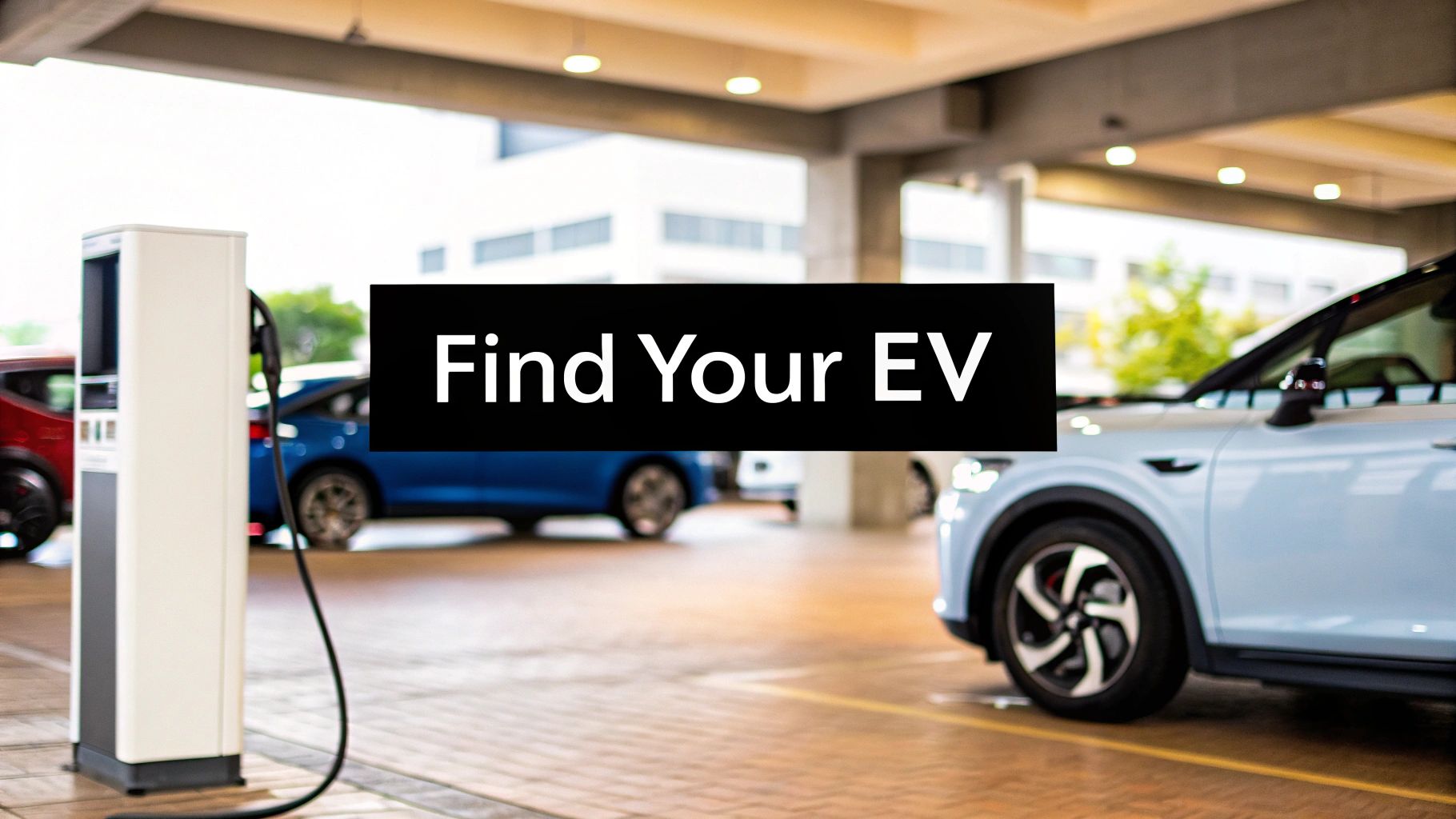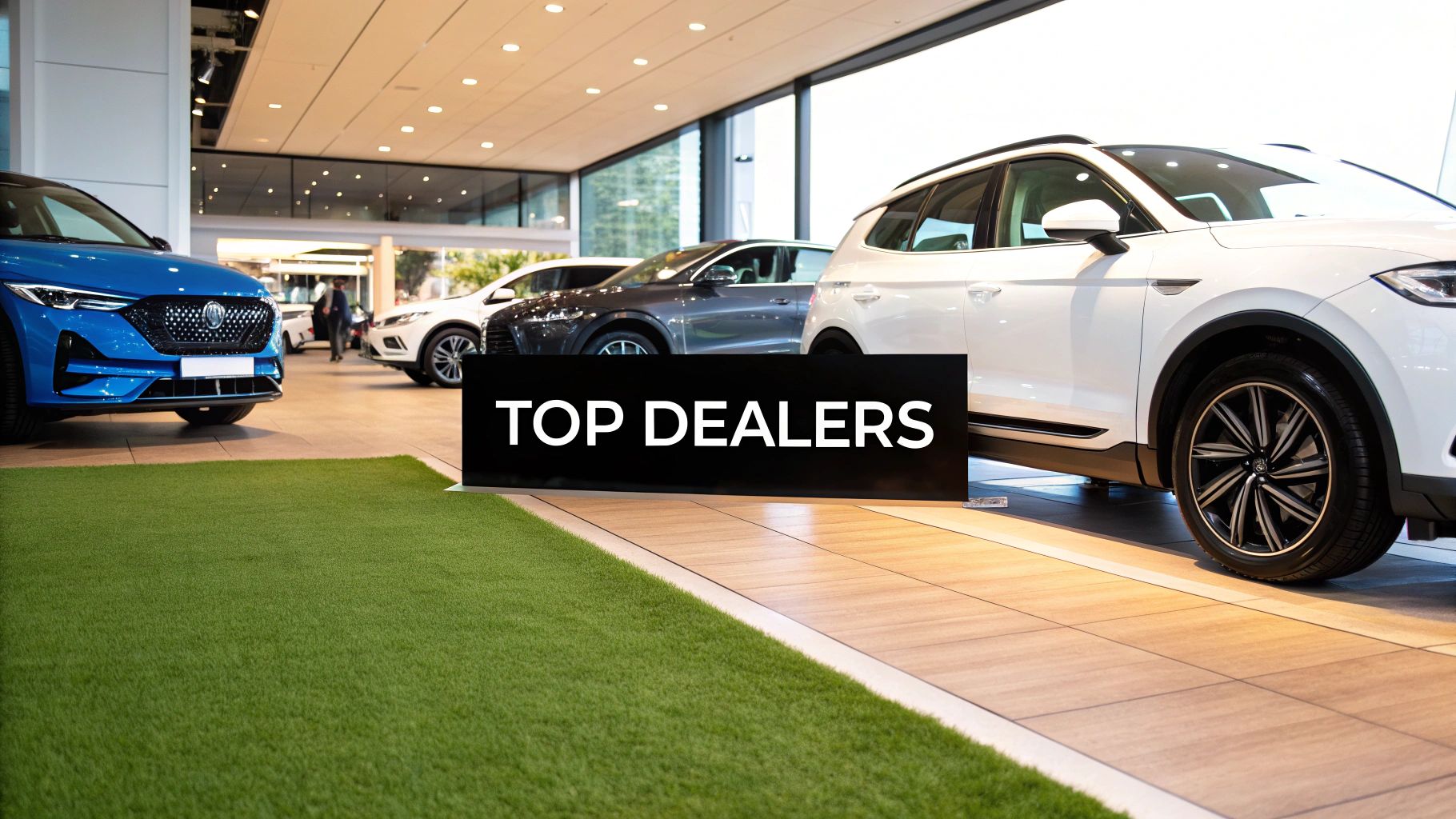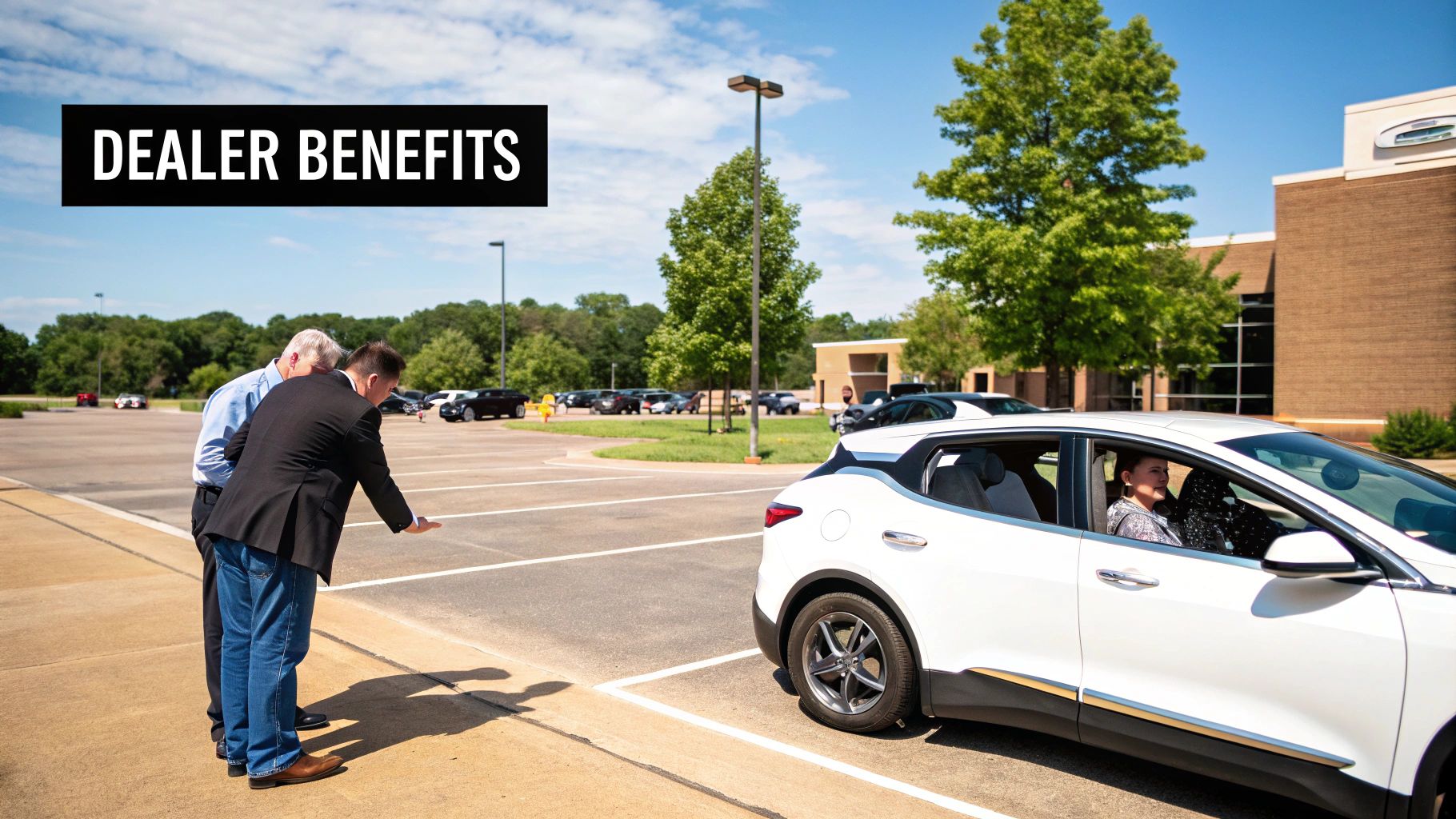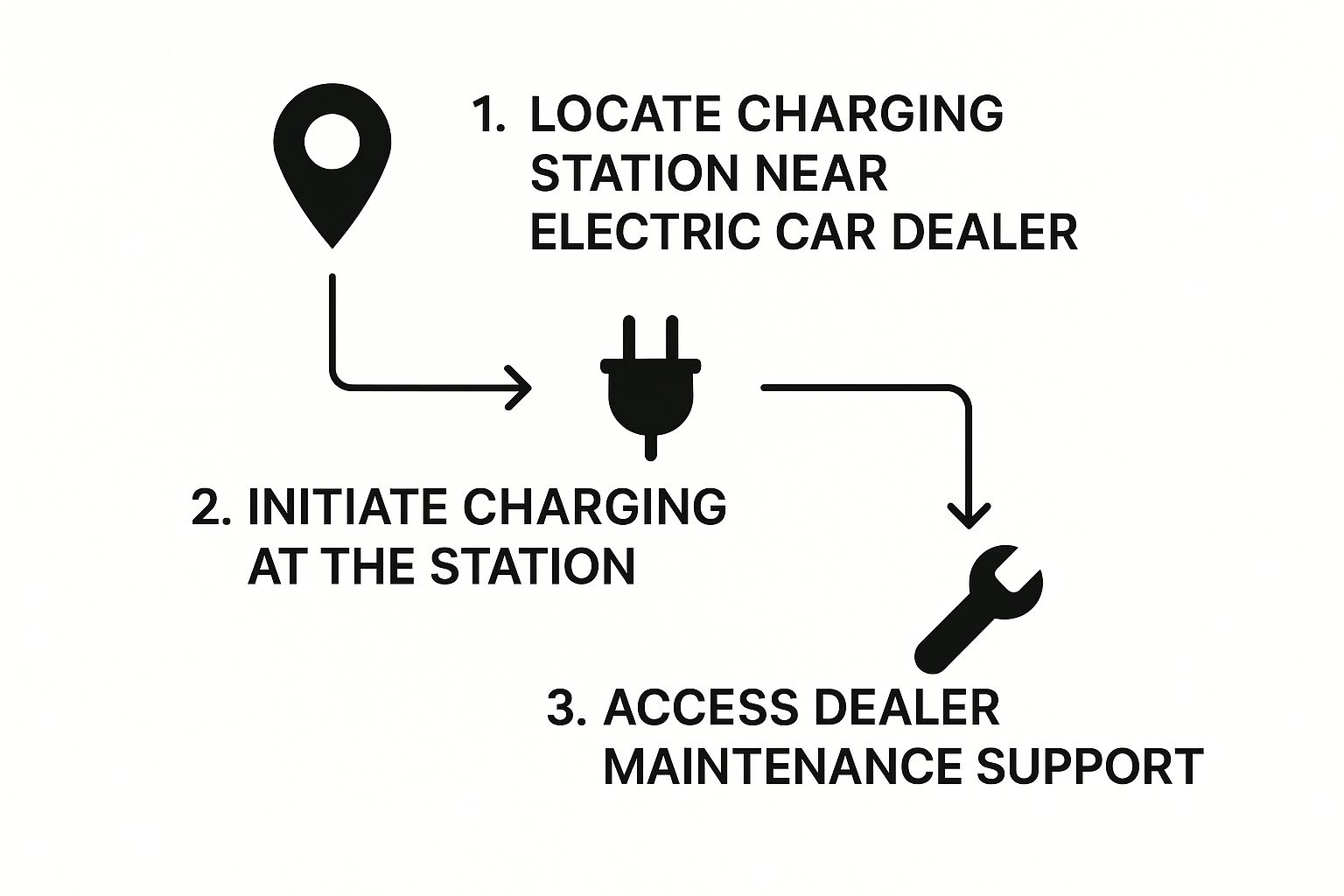
Ethiopia's Rapid Shift to Electric Vehicles
Ethiopia is diving headfirst into a new era of transportation, quickly becoming a leader in Africa's electric vehicle movement. This isn't some slow, gradual change; it's a decisive pivot away from petrol and diesel cars, sparking an urgent and exciting new market. For anyone looking to buy a car, understanding the landscape of electric car dealers in Ethiopia is now more important than ever.
What's driving this incredible transformation? Bold government action. In 2023, Ethiopia made headlines as the first country in the world to completely ban the import of non-electric cars. That one policy has ignited a firestorm of EV adoption.
The Policy That Changed Everything
The government's motivation is clear and practical, focused on both economic stability and environmental health. By stopping petrol and diesel car imports, the nation is tackling its massive, multi-billion dollar bill for foreign oil. It's a smart move that not only keeps valuable foreign currency at home but also aligns with global efforts to fight climate change and clean up the air in cities like Addis Ababa.
In essence, the policy has thrown the doors wide open for electric vehicles, making them the new standard for anyone buying a car.
This strategic shift has had an immediate and powerful effect. The number of electric vehicles on Ethiopian roads has already jumped to around 100,000. That means EVs now make up about 8.3% of all registered vehicles in the country—a truly stunning figure for such a short time.
What This Means For You
This fast-paced transition creates a world of opportunity, but it also brings up new questions for car buyers. The market is buzzing with activity, with new dealers and models showing up all the time. Getting a handle on this new environment is the first step to making a great purchase. This local change is also part of a bigger global picture, reflecting the automotive digital transformation strategies that are changing how we all buy and own vehicles.
For anyone thinking about going electric, this new reality offers some serious advantages:
- More Choices: The import ban means a steady flow of new EV models are landing in Ethiopia.
- Cheaper to Run: Ethiopia has plenty of affordable hydropower, making the cost to charge an EV a fraction of what it costs to fill a tank with petrol.
- Supportive Environment: The government's policy is built to encourage EV ownership, which could lead to even more benefits down the road.
Navigating this exciting new terrain starts with knowing where to look and who to trust. As you begin your journey, our guide on how to buy an electric car in Ethiopia is a great place to start, offering practical insights into the whole process.
Navigating Ethiopia's Electric Vehicle Scene

The electric vehicle market in Ethiopia isn't just growing—it's completely rewriting the country's transportation story. This isn't some slow, gradual shift; it's a rapid change driven by a smart economic strategy, and it’s creating a fascinating new world for car buyers. If you want to find the right vehicle from the best electric car dealers in Ethiopia, you first need to understand the forces at play.
At its core, this EV boom is a direct response to a major economic headache: fossil fuels. For years, importing petrol and diesel has drained the nation's foreign currency reserves. Electric vehicles offer a powerful, homegrown solution, running on Ethiopia's plentiful and cheap hydroelectric power.
This simple economic reality has ignited a fire under the market. The numbers speak for themselves, as shown in the table below, painting a clear picture of a nation quickly embracing electric mobility.
Key EV Market Indicators in Ethiopia
| Metric | Figure/Status |
|---|---|
| New Car Registrations (EVs) | Over 60% in 2024 |
| Annual Fuel Import Cost | Exceeds $4 billion |
| Total EV Fleet Growth | From ~4,600 (2023) to an estimated 14,000 (2025) |
| Primary Power Source | Abundant, locally-produced hydroelectricity |
These figures aren't just statistics; they represent a fundamental change in consumer behaviour and national policy. The incredible growth from a few thousand vehicles to over 14,000 in just two years shows how quickly things are moving. To get a deeper dive into this trend, you can explore more details on Ethiopia's EV expansion.
The Cars You’ll Actually See on the Road
When you start looking around, you'll quickly notice the market has settled into two distinct categories.
- Affordable City Cars: These are the real workhorses of the EV revolution here. Small, practical, and easy on the wallet, you’ll see compact models from brands like BYD and other Chinese manufacturers everywhere. They are perfectly suited for zipping through Addis Ababa’s traffic and make EV ownership a realistic goal for many Ethiopians.
- Premium and Luxury Models: On the other end of the spectrum, you have the high-end options. Think Volkswagen's ID series or even the occasional Tesla. These are typically brought in by specialised importers for buyers who want the latest tech, longer driving ranges, and all the bells and whistles.
A Few Hurdles to Keep in Mind
While the enthusiasm is undeniable, it’s important to go in with your eyes open. The biggest challenge for any new EV owner right now is the public charging infrastructure. It’s growing, but it’s still in its infancy.
Think of it like the early days of mobile phones. At first, you only got a signal in the big cities. Over time, the network expanded to cover the whole country. Ethiopia's charging network is on that same path, but for now, home charging is king.
This means that for the time being, most EV owners do the vast majority of their charging overnight at home. It’s absolutely essential to talk to your dealer about home charger installation. Getting the car is only half the battle; having a reliable way to charge it every day is just as crucial.
Who Are the Key Electric Car Dealers in Ethiopia?

As Ethiopia’s electric car revolution picks up speed, a whole new network of dealers has sprung up to meet the incredible demand. The market for electric car dealers in Ethiopia is a really interesting mix right now. You’ve got established local showrooms, entrepreneurial importers, and specialised online platforms all playing a part.
Figuring out who these players are is the first step to finding the right EV for you.
Essentially, the scene is split into two camps. On one side, you have the traditional, walk-in dealerships, many of whom have cleverly switched from petrol cars to focusing on popular EV models. On the other, you have modern import facilitators who connect Ethiopian buyers directly with the global EV market.
Each option has its own perks. Local showrooms let you see and test-drive a car before you commit, which is a huge plus. But import services throw the doors wide open to a much bigger selection, including top-tier brands you won't find on a local forecourt.
Traditional Dealerships in Addis Ababa
Addis Ababa is ground zero for Ethiopia's EV movement, and its dealerships are at the centre of it all. These businesses tend to stock the models that have hit the sweet spot for the local market—think compact, affordable city cars from brands like BYD and other Chinese manufacturers that have really taken off.
There are some clear advantages to buying from a local dealer:
- Immediate Availability: You can often drive away in the car you see on the lot, skipping the long waits that come with importing.
- A Hands-On Experience: Nothing beats physically inspecting a car, sitting in the driver's seat, and getting a real sense of its quality and space.
- Local Know-How: These dealers know which cars handle Ethiopian roads best and can give you solid, practical advice based on real-world experience.
The main drawback? Their stock is usually limited to the most popular, fastest-selling models. If you’re after a specific colour, trim, or a less common brand, you might have to explore other avenues.
Specialised Importers and Online Platforms
This is where specialised importers and online platforms like EV24.africa really shine. For anyone wanting more choice, these services bridge a critical gap by making it possible to buy premium brands that aren't stocked locally. They take care of the entire, often tricky, process of buying a car overseas and getting it to your door in Ethiopia.
This new way of buying a car is making high-end brands a real possibility for more people. We're now seeing a growing number of premium EVs, like Teslas, on the roads of Addis Ababa. While it's still a small segment, services that handle the logistics, customs, and financing are making it much simpler to own one of these amazing vehicles. Learn more about acquiring a Tesla in Ethiopia.
Going through an importer gives you access to a global showroom. You can pinpoint the exact make, model, and features you want. These experts handle the headaches of international shipping, customs duties, and local registration, turning a potentially overwhelming process into a smooth one. It’s the perfect route for anyone who has their eye on specific models from global giants like Volkswagen or Hyundai.
How to Choose the Right EV Dealer
Picking the right dealer is about more than just a purchase; it’s about starting a relationship that will last the lifetime of your car. As the market for electric car dealers in Ethiopia heats up, knowing how to choose wisely is the key to a smooth and enjoyable ownership experience.
Think of it this way: you wouldn't choose just any doctor for your family, would you? You want someone you can trust, someone with real expertise who'll be there when you need them. The same goes for your EV dealer. They don't just sell you a car; they provide the support system that keeps it running perfectly for years.
This means you have to look past the shiny showroom models and dig a little deeper. A good dealer will be an open book, ready to talk honestly about everything from the battery's health to where you'll get spare parts down the road.
Look Beyond the Price Tag
Of course, the initial cost matters. But it’s just one part of a much bigger picture. The real value of a dealer shines through long after you’ve driven away. That tempting lower price might seem great at first, but it can quickly turn into a headache if it comes with poor after-sales service or no plan for getting spare parts.
You need to focus on the complete package. This includes the warranty, access to technicians who actually know their way around an EV, and clear guidance on what maintenance will look like.
A reputable dealer sees the sale as the beginning of your journey, not the end. Their commitment to after-sales service is the single most important indicator of their quality and your future peace of mind.
To really size up your options, you need to evaluate a few critical areas. Your goal is to find a true partner who will support you and your vehicle every step of the way.
Your Dealer Evaluation Checklist
Use this simple checklist to compare dealers and make a choice you feel good about. Asking these questions will tell you a lot about the kind of service you can truly expect.
| Evaluation Criterion | What to Look For | Why It Matters |
|---|---|---|
| After-Sales Support | Ask about their service centre and certified technicians. Are they actually EV specialists? | An EV isn’t a petrol car. It needs special tools and know-how for everything from software updates to battery diagnostics. |
| Warranty Details | Get the battery and vehicle warranty details in writing. What’s covered, and for how long? | The battery is the heart of your EV and its most expensive part. A solid warranty is your best protection against defects. |
| Spare Parts Availability | Find out about their supply chain for common parts. Do they keep them in stock or have a reliable way to import them? | You don't want your car stuck for weeks waiting on a simple part from overseas. A dealer with a solid parts plan keeps you on the road. |
| Home Charging Solutions | Does the dealer sell and install home chargers? Can they connect you with a qualified electrician? | Since public charging is still developing in Ethiopia, reliable home charging is a must. A dealer who helps with this is a huge plus. |
By focusing on these practical points, you can confidently select one of the best electric car dealers in Ethiopia and ensure your switch to electric driving is as smooth as it should be.
A Step-By-Step Guide to Importing Your EV
So, what happens when the perfect electric car for you isn't sitting on a lot in Addis Ababa? It's a common situation. For many buyers in Ethiopia, the exact model, trim, or even colour they've set their heart on might be thousands of miles away. This is where importing comes in, and while it might sound intimidating, the right service can make it surprisingly simple.
Platforms like EV24.africa have really changed the game here. Think of it as having a personal expert who handles all the tricky logistics—from tracking down your ideal car abroad to getting it delivered right to your doorstep. This approach blows the doors wide open, giving you access to a global showroom instead of just a local one.
It all starts with you picking out your car. You're no longer limited to what’s available nearby; you can browse a massive online selection. Once you find the one, the import service takes over, managing the entire purchase and shipping headache for you.
How The Import Process Actually Works
The real magic of using an import facilitator is how they navigate all the technical stuff. These services are built to manage every single detail, making sure your vehicle arrives safely, legally, and without any last-minute drama.
Here’s a simple breakdown of what that looks like:
- Vehicle Selection and Purchase: You choose the car, and the service handles the secure international payment and transfer of ownership. Simple as that.
- International Shipping: They take care of getting the car from its home country all the way to the Port of Djibouti, handling all the freight and insurance details.
- Customs Clearance: This is usually the biggest hurdle for most people. An import expert deals with all the necessary paperwork, calculates the duties, and manages the inspections required by Ethiopian customs.
- Inland Transport and Final Delivery: After clearing customs, your EV is transported from Djibouti to a pre-arranged spot in Ethiopia. All that's left is for you to get the keys.
This infographic shows how the support doesn't stop once you have the car. The best electric car dealers in Ethiopia provide charging and maintenance help to complete the ownership cycle.

As the visual shows, a dealer's job goes far beyond just the initial sale. They are your connection to the essential network needed for day-to-day driving and long-term upkeep.
Key Things to Keep in Mind for a Smooth Import
Before diving in, it’s absolutely essential to get a clear picture of the costs and regulations. A good import service will give you a transparent, all-in quote. This should cover the vehicle price, shipping, insurance, customs duties, and any local taxes. No one likes unwelcome surprises.
The most important thing is transparency. A trustworthy import partner will make sure there are no hidden fees. The price you agree on should be the final price you pay to get your car registered and on the road in Ethiopia.
Getting familiar with the specific rules is also crucial for a hassle-free experience. For a complete rundown of everything you need to know, our guide on Ethiopia EV import guidelines for 2025 is a must-read. It covers customs compliance and any available incentives, ensuring you're fully prepared.
By working with an expert importer, you can bring the exact electric car you’ve been dreaming of to Ethiopia with confidence. It turns a potentially overwhelming process into a clear, managed journey, putting that perfect EV right within your grasp.
The Future of EV Dealerships in Ethiopia

Ethiopia's electric vehicle story is really just beginning, but the road ahead looks incredibly bright. The momentum we're seeing today is paving the way for a much more vibrant market, and electric car dealers in Ethiopia are right at the centre of it all.
Looking ahead, the dealership model itself is set to change quite a bit. It’s going to move beyond just selling cars to becoming a complete hub for EV owners. This is a natural and necessary evolution as the market grows up and drivers' needs get more complex.
What Is Coming Next
Several exciting developments are on the horizon that will completely reshape what it means to own an EV in Ethiopia. These changes are aimed at tackling current roadblocks and opening up new possibilities for drivers everywhere.
- Charging Infrastructure Expansion: Get ready for a serious push to build out a public charging network. This will make longer trips far more manageable and ease the dependence on charging at home.
- Affordable EV Models: As car manufacturers around the world ramp up production, we'll start seeing a much wider range of budget-friendly EVs. This will put electric mobility within reach for many more Ethiopians.
- Specialised Repair Ecosystem: A proper network of trained technicians and service centres is starting to take shape. Soon, getting the specialised maintenance and spare parts that EVs need will become routine.
This growing ecosystem is a clear sign of a healthy, long-term market. It shows that the shift to electric isn't just a trend but a permanent change in how Ethiopia moves.
As things progress, keeping an eye on the latest models is a smart move. You can get a sneak peek at the top electric vehicles for the Ethiopian market in 2025 to see what’s on its way. The future is bright, and it's powered by electricity.
Got Questions? We’ve Got Answers
Stepping into the world of electric vehicles is exciting, but it’s natural to have a few questions. We get it. Here are some straightforward answers to the things most people ask when looking at electric car dealers in Ethiopia, helping you make your decision with total confidence.
Key Purchase Considerations
What are the main government incentives for buying an electric car in Ethiopia?
The biggest advantage by far is the government's game-changing decision to ban the import of petrol and diesel cars. This isn't just a policy on paper; it’s backed by a massive financial break. The heavy duties and taxes that used to inflate the price of traditional cars have been slashed for EVs, meaning the final price you pay is much, much lower.
Can I get financing for an electric car purchase in Ethiopia?
Absolutely. Getting a loan for an EV is getting easier all the time. Local banks are now rolling out financing plans specifically for electric car buyers. Plus, dedicated import specialists like EV24.africa often have relationships with lenders, which can make the whole application and approval process a lot smoother for you.
What should I know about charging my EV at home in Ethiopia?
For most EV owners here, home is where the charge is. Our public charging network is still in its early days, so topping up overnight at your house is the most practical option. You can use a standard wall socket, but we highly recommend installing a dedicated Level 2 charger. It’s faster, safer, and just more efficient. Always ask your dealer if they can help with installation or point you to a qualified electrician.
Owning an EV brings a few new things to learn. Down the road, you might even find yourself looking into topics like understanding electric car key replacement, which is a normal part of the ownership journey.
Ready to find the right electric car for you? Dive into a huge selection of top EV brands and get expert help with importing, financing, and delivery at EV24.africa. Your journey starts here: https://ev24.africa.




